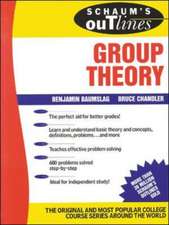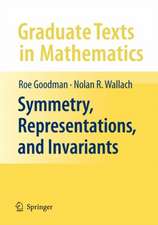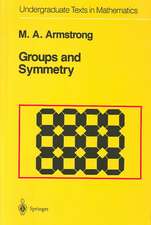Introduction à la théorie des groupes de Lie
Autor Roger Godementfr Limba Franceză Paperback – 25 noi 2003
Preț: 315.95 lei
Nou
Puncte Express: 474
Preț estimativ în valută:
60.46€ • 63.28$ • 50.32£
60.46€ • 63.28$ • 50.32£
Carte tipărită la comandă
Livrare economică 26 martie-01 aprilie
Preluare comenzi: 021 569.72.76
Specificații
ISBN-13: 9783540200345
ISBN-10: 3540200347
Pagini: 320
Dimensiuni: 155 x 235 x 17 mm
Greutate: 0.45 kg
Ediția:2004
Editura: Springer
Colecția Springer
Locul publicării:Berlin, Heidelberg, Germany
ISBN-10: 3540200347
Pagini: 320
Dimensiuni: 155 x 235 x 17 mm
Greutate: 0.45 kg
Ediția:2004
Editura: Springer
Colecția Springer
Locul publicării:Berlin, Heidelberg, Germany
Public țintă
Professional/practitionerDescriere
Ces notes de cours donnés il y a une trentaine d'années à Paris mais restées d'actualité couvrent la théorie générale des groupes de Lie, ainsi que quelques points de la théorie des groupes topologiques, groupes discontinus notamment. Le cas des groupes linéaires, exposé avant la théorie générale par la méthode de von Neumann, permet d'expliquer plus naturellement le formalisme de celle-ci. Ce livre pourra aussi compléter les volumes III (3-540-66142-5) et IV (43841-6) de l'Analyse Mathématique du même auteur.
Cuprins
Groupes topologiques.- Espaces et groupes simplement connexes.- Propriétés analytiques des groupes linéaires.- Variétés et groupes de Lie.- Algèbre de Lie d'un groupe de Lie.- L'application exponentielle dans un groupe de Lie.
Recenzii
This delightfully idiosyncratic work is a welcome addition to the literature on Lie groups. In contrast to many of the polished texts on the topic, which present the subject as if it had sprung, fully mature, from the heads of one or other of the olympian scholars who have moulded it, these tomes introduce first matrix groupsand then general Lie groups. Godement begins with topological groups, covering groups, and linear groups, and describes, hands-on, the relation between Lie algebras and Lie groups for the matrix groups and their covering groups. He later introduces manifolds, abstract Lie groups, and the differential geometric approachto the connection between Lie groups and algebras. The reader, fore-warned that general Lie groups are in fact no more than covering groups or matrix groups, is enabled to handle the abstract theory with confidence by having already understood the concrete approach. [...]Students could do much worse than to work their way through, and for the advanced, the occasional insight, the fresh points of view, and the author's mordant asides make it a worthwhile read. Recommended.
M. Cowling in ZentralblattMath















